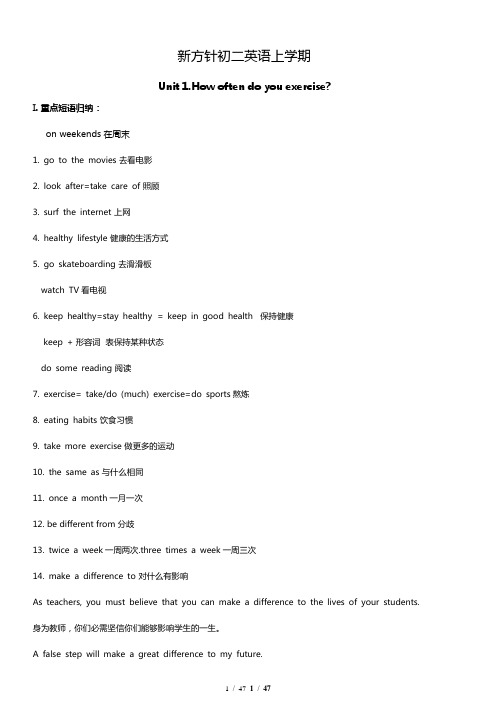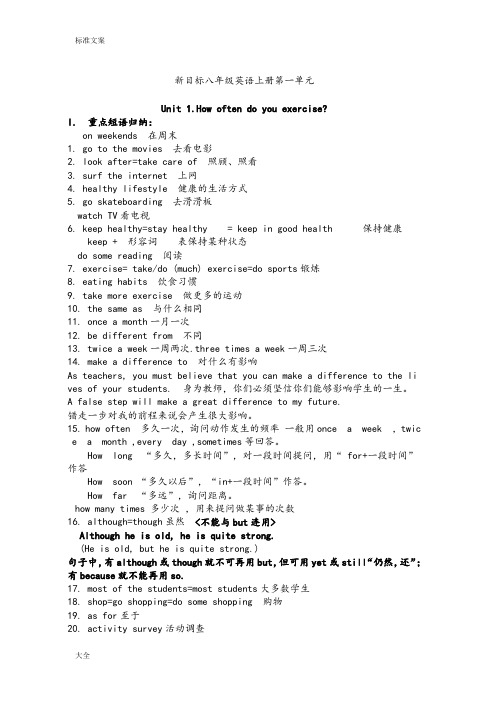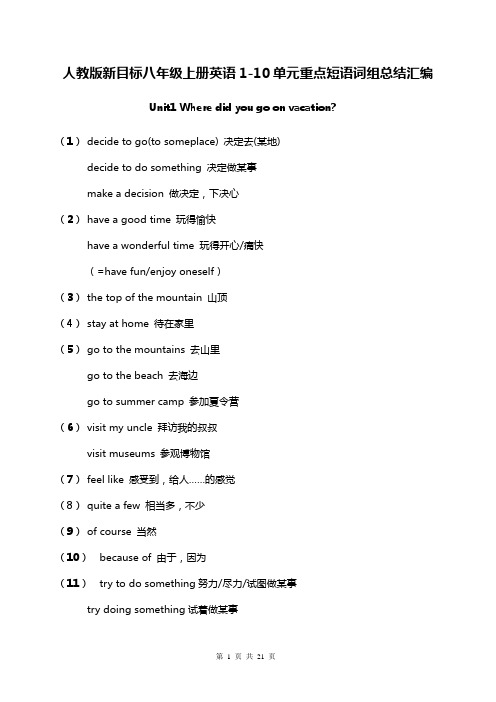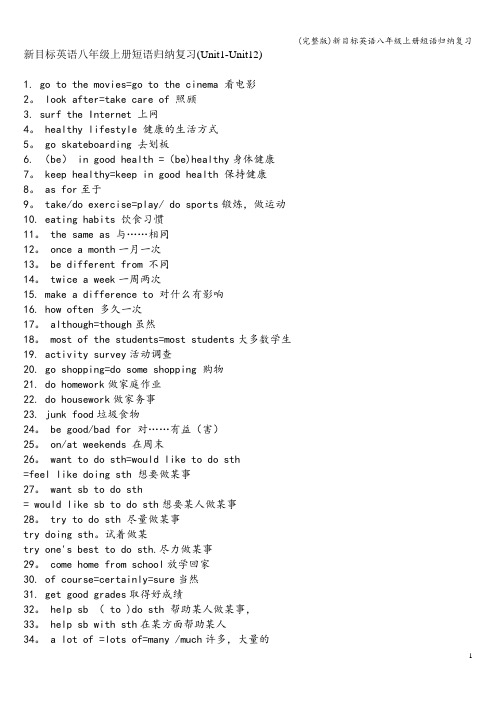【人教新目标版】八年级英语上册:全册短语、语法知识点汇总
- 格式:docx
- 大小:141.50 KB
- 文档页数:65

新方针初二英语上学期Unit 1.How often do you exercise?I. 重点短语归纳:on weekends 在周末1. go to the movies 去看电影2. look after=take care of 照顾3. surf the internet 上网4. healthy lifestyle 健康的生活方式5. go skateboarding 去滑滑板watch TV看电视6. keep healthy=stay healthy = keep in good health 保持健康keep + 形容词表保持某种状态do some reading 阅读7. exercise= take/do (much) exercise=do sports熬炼8. eating habits 饮食习惯9. take more exercise 做更多的运动10. the same as 与什么相同11. once a month一月一次12. be different from 分歧13. twice a week一周两次.three times a week一周三次14. make a difference to 对什么有影响As teachers, you must believe that you can make a difference to the lives of your students. 身为教师,你们必需坚信你们能够影响学生的一生。
A false step will make a great difference to my future.错走一步对我的前程来说会产生很大影响。
15. how often 多久一次,扣问动作发生的频率how many times 多少次,用来提问做某事的次数16. although=though虽然 <不能与but连用>Although he is old, he is quite strong.(He is old, but he is quite strong.)句子中,有although或though就弗成再用but,但可用yet或still“仍然,还”;有because 就不能再用so.17. most of the students=most students大大都学生18. shop=go shopping=do some shopping 购物19. as for至于20. activity survey活动调查21. do homework做家庭作业22. do house work做家务事23. eat less meat吃更少的肉24. junk food垃圾食物25. be good for 对什么有益26. be bad for对什么有害27. want to do sth 想做某事28. want sb to do sth想或人做某事29. try to do sth 尽量做某事30. come home from school放学回家31. of course=certainly=sure当然32. get good grades取得好成绩33. some advice 一些建议some advice 中的advice 是弗成数名词 a piece of advice 一则建议give advice 提出建议take one’s advice 采纳或听从或人的建议4. help sb to do sth辅助或人做某事=help sb with sth35. a lot of vegetables=many vegetables许多蔬菜36. hardly= almost not几乎不 hardly ever很少,几乎不,从不37. keep/be in good health保持健康38.your favorite program你最喜欢的节目39. Animal World 动物世界40. play soccer踢足球41.every day 每天every day 与 everyday1. every day 作状语,译为“每一天”。

新目标八年级英语上册第一单元Unit 1.How often do you exercise?I. 重点短语归纳:on weekends 在周末1. go to the movies 去看电影2. look after=take care of 照顾、照看3. surf the internet 上网4. healthy lifestyle 健康的生活方式5. go skateboarding 去滑滑板watch TV看电视6. keep healthy=stay healthy = keep in good health 保持健康keep + 形容词表保持某种状态do some reading 阅读7. exercise= take/do (much) exercise=do sports锻炼8. eating habits 饮食习惯9. take more exercise 做更多的运动10. the same as 与什么相同11. once a month一月一次12. be different from 不同13. twice a week一周两次.three times a week一周三次14. make a difference to 对什么有影响As teachers, you must believe that you can make a difference to the li ves of your students. 身为教师,你们必须坚信你们能够影响学生的一生。
A false step will make a great difference to my future.错走一步对我的前程来说会产生很大影响。
15.how often 多久一次,询问动作发生的频率一般用once a week ,twice a month ,every day ,sometimes等回答。

人教版初二上册英语学问点总结归纳八年级〔初二〕上册英语语法、短语和学问点总结归纳Unit 1 Where did you go on vacation?本单元的话题:谈论假期活动内容,复习一般过去时。
本单元的语法:1.复习一般过去时;2.学习不定代词和不定副词的用法。
2.不定代词和不定副词的用法:(1)左边的some、any、every、no 与右边的body、one、thing 构成不定代词,some、any、every、no 与右边的疑问副词where 构成不定副词;(2)一般状况下以some 开头的不定代词和不定副词用于确定句,以any 开头的不定代词和不定副词用于否认句、疑问句;以no 开头的不定代词和不定副词表示否认含义(no one 为两个单词);(3)不定代词或不定副词和形容词连用时,形容词放在后面。
He has something important to do. 他有重要的事情要做。
(确定句用something,形容词important 放后)Did you buy anything special? (一般疑问句用anything,形容词special 放后)Did you go anywhere interesting last month? 上个月你去令人感兴趣的地方了吗?(一般疑问句用不定副词anywhere,形容词interesting 放后)(4)不定代词和不定副词做主语时,后面的动词用单数形式。
Everone is here today.今日每个人都在这里。
本单元的短语和学问点:1.go on vacation 去度假go to the mountains 上山/进山2.s tay at home 呆在家go to the beach 去海滩visit museums 参观博物馆go to summer camp 去参观夏令营3. study for tests 为考试而学习\备考go out 出去4. quite a few 相当多,不少(后跟可数名词复数)take photos 照相most of the time大局部时间5.buy sth for sb = buy sb sth为某人买某物6.taste good. 尝起来很好taste(尝起来)、look(看起来)、sound(听起来)为感官动词,后跟形容词7.h ave a good\great\fun time 过得快活,玩得开心(=enjoy oneself) 8. go shopping 去购物9. nothing…but+动词原形:除了……之外什么都没有He had nothing to do at home but read yesterday.昨天他在家除了读书无事可做。

人教版新目标八年级上册英语1-10单元重点短语词组总结汇编Unit1 Where did you go on vacation?(1)decide to go(to someplace) 决定去(某地)decide to do something 决定做某事make a decision 做决定,下决心(2)have a good time 玩得愉快have a wonderful time 玩得开心/痛快(=have fun/enjoy oneself)(3)the top of the mountain 山顶(4)stay at home 待在家里(5)go to the mountains 去山里go to the beach 去海边go to summer camp 参加夏令营(6)visit my uncle 拜访我的叔叔visit museums 参观博物馆(7)feel like 感受到,给人……的感觉(8)quite a few 相当多,不少(9)of course 当然(10)because of 由于,因为(11)try to do something努力/尽力/试图做某事try doing something试着做某事have a try 尝试一下(此处try为n.)(12)dislike somebody/something 厌恶/不喜欢某人/某物(13)be/get bored with 对……厌倦(14)have a great difference in…在……方面存在很大差异make a difference 有影响,有转折,创造不同/有所成就be different from…与……不同(15)by oneself 某人独自(= on one's own)Unit2 How often do you exercise?(1)at least 至少,不少于,起码at most 至多,最多,不超过(2)such as 例如(3)more than 多于less than少于(4)use the Internet 使用网络(5)watch television/TV看电视(6)read English books 看英语书籍(7)go online 上网go shopping 去购物(8)eat vegetables and fruit 吃水果和蔬菜(9)most of the time 大部分时间(10)stay up late 熬夜, 晚睡(=burn the midnight oil)(11)healthy habits健康的习惯(12)Old habits die hard旧习难改(13)do housework 做家务help with housework 帮忙做家务do homework 做家庭作业(14)junk food垃圾食品fast food快餐,速食instant noodles方便面instant coffee速溶咖啡(15)hardly ever 几乎从不(16)once a day一天一次once a week一周一次once a year一年一次once again再次(17)twice a day一天两次twice a week一周两次twice a year一年两次once or twice一两次,偶尔(18)be full of sth. (有)大量的,丰富的(=be filled with sth.)(19)a full bottle of wine一满瓶葡萄酒a full day of…一整天的……a full life一个经历丰富的人生the full story全部情况(20)swing dance摇摆舞(21)be good for one’s health对某人身体健康好be bad for one’s health 对某人身体健康有害(22)keep healthy 保持健康stay healthy 保持健康healthy lifestyle健康的生活方式healthy food有益健康的食物(23)one/a hundred percent百分百one percent 百分之一fifty percent百分之五十one percent of students…百分之一的学生……how many percent of the students…? 百分之几/多少的学生……?(24)常见的频度副词排序(程度从高到底)如下:always 总是100%almost always 几乎总是90%usually 通常80%often 经常60%sometimes 有时40%seldom 很少20%hardly ever 几乎不曾5%almost never 几乎从不 2%never 从不0%(25)how often…? 问频率,意为“多久一次”how soon…? 问将来,意为“多久以后”how long…? 问时间段,意为“多久”,“多长时间”(26)sometimes是副词,意为“有时”,常用于一般现在时,表示频率some times意为“几次;几倍”sometime意为“某时”,可用于过去时或将来时some time意为“一段时间”(27)be good for对……有益be good at 擅长……be good to 对……友善Unit3 I’m more outgoing than my sister.(1)care about 关心,在意care for 关心,照顾,喜欢(2)be different from 与……不同/有差异(3)bring out 使呈现,使表现出(4)the same as 和……相同/一致(5)in fact 事实上,实际上(6)be similar to 与……相似的(7)primary school 小学(8)be talented in在……方面有天赋(9)do the same things 做同样的事情(10)be good at sports 擅长运动(11)make sb. laugh让某人笑laugh at sb.嘲笑/取笑某人laugh with sb.与某人同声笑laugh loudly 大声笑(12)be quiet/keep quiet 保持安静(13)win a competition赢得一场比赛competition and cooperation 竞争与合作(14)true or false 是非,正误(15)be serious about 对……是认真的take it seriously 认真对待(16)It is (not)necessary to do sth. (没)有必要做某事(17)touch my heart触动我的心灵in touch with 和……有接触/有联系get in touch 取得联系keep in touch with 与……保持联系(18)break one’s arm摔断了胳膊break the rule违反规则(19)share…with sb.与某人分享某物lion’s share 最大的份额(20)collect information 收集信息get information 得到信息receive information 收到信息provide information提供信息a piece of information 一条消息(21)“the+比较级,the+比较级”表示“越……,就越……”The more, the better. 越多越好Unit4 What’s the best movie theater?(1)(be) close to 离……近(=next to)close friends 密友(=bosom friends知心朋友)a close game势均力敌的比赛(2)big screens 大屏幕(3)think about/ of 思考,考虑(4)do a survey of 做……的调查(5)as for 至于(6)win the prize for 获得……奖(7)the worst service 最差的服务(8)the cheapest price 最便宜的价格(9)in the south of China 在中国南部(10)talent show 才艺表演(11)have ...in common 有相同特征(12)all kinds of 各种各样的(13)be up to 是……的职责(14)play a role in…在……中发挥作用(=play a part in…)(15)make up 编造,化妆,组成(16)for example 例如(17)唱快歌sing fast songs(18)take ...seriously 认真对待……(19)come true 实现(20)be careful of 当心,小心(21)look for 寻找(强调动作)find 找到(强调结果)(22)act as 作为,担当,充当(23)How do/does sb. like ...? 意为“某人认为……怎么样?”(=“What do/does sb. think of...?”或“What do/does sb. think about ...?”)(24)so far 到目前为止,迄今为止(= till now)Unit5 Do you want to watch a game show?(1)action movie 动作片(2)find out 查明,弄清(3)take sb’s place 代替,替换(=take the place of sb.)(4)be ready to do sth. 愿意做某事get ready for 为……做准备,强调动作be ready for 为……做好了准备,强调状态get sth. ready 把某物准备好(5)do a good job干得好(6)dress up 装扮,乔装打扮dress up (in) 穿上……盛装,用……装饰dress up as sb/sth. 装扮成某人或某物(7)talk show 脱口秀(8)talent show 才艺表演(9)can’t stand 受不了,不能忍受(10)soap opera肥皂剧(11)plan to do sth. 计划去做某事make a plan/plans 制定计划(12)sth.+happens/happened +to+sb. 某人发生某事sb. Happens/happened to do sth. 某人碰巧做某事(13)happen 偶然发生(无被动形式)take place 有计划发生(无被动形式)(14)expect (sb.) to do sth. 期望(某人)去做某事be expected to do sth. 被期望去做某事(15)be famous for... 因......而著名be famous as... 作为......而出名(16)good luck to sb. 祝某人好运bad luck 倒霉,坏运气(17)stand against 反对stand for 代表,表示stand out 突出;显著(18)appear to do sth. 似乎在做某事(19)succeed in doing sth. 成功做某事(be successful in doing sth.)(20)common names 常见的名字common mistakes 常犯的错误common sense 常识common interest 共同的兴趣common language 共同语言common market共同市场(21)an ordinary worker 一个普通工人ordinary-looking 相貌平常的(22)normal temperature 正常体温normal state 正常状态(24)hope for sth. 希望得到某物hope to do sth. 希望做某事(25)wish sb. sth. 希望某人有某物wish to do sth. 希望做某事wish sb. to do sth. 希望某人做某事(hope没有这种用法)Unit6 I’m going to study computer science(1)write down 写下,记下(2)have to do with 关于,与……有关系have nothing to do with…与……无关(3)take up 学着做,开始做;占据,占用(4)agree with 同意,赞成(后面接表示人或表示“意见,观点”的词)agree to 赞同,同意(后面接表示计划,提议,办法,安排等词,to是介词)(5)personal improvement 自我改进(6)make promises 许诺give a promise 许下诺言keep a promise 信守诺言(=keep one’s word)carry out a promise 履行诺言break a promise 违背诺言promise to do sth. 答应/许诺做某事(7)have something in common 有共同点(8)improve relationships 改善关系(9)at the beginning 在……开始(10)for this reason因为这个原因(11)send for 派人去叫send away 派遣,解雇send off 送别,差遣send up 发射(12)make a resolution做决定,下决心(13)make sure(of)确信(=be sure)(14)discuss sth. with sb. 和某人谈论某事(15)grow up 成长,长大grow into 长大成为(16)be going to do sth. 打算,准备,计划做某事(将来时)(17)make a plan for…为……制定计划(18)a kind of 一种all kinds of 各种各样的kind of 有点(= a little)Unit7 Will people have robots? (1)space station太空站(2)over and over again 多次,反复地(3)hundreds of 数以百计,许多,大量(4)be able to do sth. 能够做某事be unable to do sth. 不能做某事(5)fall down 倒下,跌倒,倒塌fall asleep入睡fall behind落后于(某人或某物)fall in love with喜爱,爱上fall off 掉下fall over 跌落,被绊倒fall into落入,陷入A fall into the pit, a gain in the wit. 吃一堑,长一智(此处fall为n. 跌落)(6)look for寻找(强调动作)(7)play a part in sth.参与某事(= play a role in sth.)play a part in doing sth. 参与做某事(8)in 100 years 一百年以后(9)help with the housework帮忙做家务(10)seem impossible好像不可能(11)make robots look like humans使机器人看起来和人类一样(12)for example例如(13)have many different shapes有很多不同的外形(14)air/water pollution 空气/水污染noise pollution 噪音污染environmental pollution “环境污染(15)believe sb. 相信某人说的话believe in sb. 信任某人,相信某人的人格(16)be free to do sth. 自由地做某事(17)try sth. 尝试某事try to do sth. 尽力做某事try doing sth. 试着做某事try one’s best to do sth. 尽某人最大努力做某事(= do one’s best to do sth.)try on试穿try out 试用,试验have a try 试一试(18)look like看起来像……(应用范围最广,除了描述人、物之外,也能抽象表达事件或现象)take after像……,与……相似(最常见的是用在有血缘关系的亲子之间,外貌用的最多,也能够用在性格脾气这些内在特质上)be similar to 与……相似(一般用在相近似的物品和情境的对比上)Unit8 How do you make a banana milk shake?(1)p our…into …把……倒进……里(通常强调倾倒液体)put…into…把……放进……里(既可以放液体,也可以放固体)pour out 倒出(2)t urn on 接通,打开(电源开关)turn off 关闭,熄灭(灯、煤气等)turn up (把音量)调大,调高turn down (把音量)调小,调低turn in 上交turn into使成为;翻译成turn to转向turn over翻转(3)cut up 切碎(4)mix up混合在一起(5)peel the bananas 剥香蕉(6)a cup of yogurt 一杯酸奶(7)five spoons of honey 五勺蜂蜜(8)add…to…把……加到……add to增加;增添(其中to是介词,后接名词或代词)add up 把……加起来add up to 总计,加起来结果是(9)celebrate with 用......庆祝(10)a piece of art一件艺术品a piece of一张,一片,一件,一条in pieces 碎片,碎块(11)cover…with…用......覆盖be covered with 被……覆盖(12)at first 起初,首先from first to last自始至终first of all 首先,第一(13)be filled with 充满......(= be full of)(14)put away把……收起来放好put on穿上put off推迟,延期put out熄灭put down放下put up建造;挂起;举起put…on…把……放在……上put together 放在一起(15)sth. needs doing 某物/事需要被做=sth. needs to be done(16)have a big meal 吃大餐(17)it’s time to do sth 到/是做某事的时候了(=it’s time for doing sth/ sth)(18)make sb. sth. = make sth. for sb. 为某人做某物Unit9 Can you come to my party?(1)prepare sth. 准备......prepare to do sth. 准备做某事prepare for an exam 为考试做准备prepare for (doing)sth. 为某事做准备prepare sth. for... 为……准备某物make preparations for 做准备(2)hang out闲逛,徘徊,逗留(=hang about)hang up挂断(电话)hang on不挂断(3)take a trip 去旅行(4)reply to(sb./sth.) 对......作出回答或答复reply for 致答辞;谢辞a reply to... 对......的答复in reply (to) 作为(对……的) 答复,为答复……(5)hear from sb. 收到某人来信(6)the day after tomorrow后天(7)another time 别的时间(8)look forward to 盼望,期待(9)turn down 拒绝(10)the day before yesterday前天(11)have the flu 患流感(12)go to the doctor 看医生(13)come to the party来参加聚会(14)meet friends见朋友(16)have to 不得不(16)invite sb to do 邀请某人做某事invite sb to someplace 邀某人去某地invite sb. for a drink 请某人喝酒(17)refuse sb. 拒绝某人refuse (sb.) to do 拒绝某人去做某事refuse sb. sth.为某事拒绝某人(作为及物动词)(18)catch one's breath 喘气,吓一跳,(由惊吓)暂时停止呼吸catch out 发觉某人的过失/错误,找破绽catch up with赶上(19)to one’s surprise 使某人吃惊的是……in surprise 吃惊地be surprised at/about 对……感到吃惊/意外(20)too much强调much,修饰不可数名词much too强调too,修饰形容词或副词(21)thanks for…为……而感谢,后接名词、代词或动名词thanks to 幸亏,由于thank sb. for sth. 为某事感谢某人be thankful to sb. for sth. 因某事而对某人心存感激(22)be busy doing sth. 忙于做某事be busy with sth. 忙于……(23)call sb. 给某人打电话(=ring sb.phone sb.ring sb. upgive sb. a callgive sb. a ringmake a phone call to sb.)(24)look forward to期待,盼望(to是介词,后面接名词,代词或动名词作宾语)(25)not…until…直到……才(26)have to 客观上不得不must主观上必须(27)can’t help doing sth 禁不住做某事help oneself to 随便用……with the help of =with one’s help在……的帮助下help sb. out 帮助某人摆脱困境help sb.(to)do sth. 帮助某人做某事Unit10 If you go to the party, you’ll have a great time! (1)keep…to oneself保守秘密;不与人来往,不交际keep doing sth. 继续做某事,保持某种状态(2)in the end/at last 最后,终于(3)make a mistake/make mistakes 犯错误by mistake错误地(不是故意做某事)(4)too…to…太……而不能……(5)advise sb. (not)to do sth. 建议某人(不)做某事(6)be angry with sb. 生某人的气be / get angry at / about sth. 因某事而生气(7)cut...in half 把……切成两半/一切为二be halfway to …完成了或做了事情的一部分(此处to是介词)(8)have lots of worries 有很多烦恼(9)the first step to do sth. 做某事的第一步(10)ask for advice 寻求建议a piece of advice一条建议give sb. advice (on) 给……提(有关……)的建议take one’s advice 听从某人的建议(11)have problems with…在……某方面有问题(12)run away from 逃离(13)solve (=deal with)problems 解决问题(14)go to the party 参加聚会go fishing 去钓鱼(15)be upset with sb. 生某人的气upset oneself 使某人自己心烦气乱(16)do enough exercise 做足够的运动(17)cook/make dinner/supper 做晚饭(18)have lots of money 有很多钱(19)eat too much 吃得太多(20)help others 帮助别人(21)a great soccer player 一个伟大的足球运动员(22)travel around the world 周游世界(23)have / be an experience有/是一次经历be experienced in 在……方面有经验have no experience at all 完全没有经验rich experience 丰富的经验practical experience 实务经验,实践经验(24)in the end 最后,终于(=at last,finally)by the end of到……为止,在……以前at the end of在……末尾,在……尽头(25)be afraid of/to do sth. 害怕做某事,不敢做某事(此外be afraid of还可以表示担心可能会发生某事)(26)worry about /over sth/sb担心某事/某人worry about=be worried about 担心(27)ask sb. to do sth. 请求/要求某人做某事其否定形式为ask sb. not to do sth.第21 页共21 页。

新目标英语八年级上册短语归纳复习(Unit1-Unit12)1. go to the movies=go to the cinema 看电影2。
look after=take care of 照顾3. surf the Internet 上网4。
healthy lifestyle 健康的生活方式5。
go skateboarding 去划板6. (be) in good health =(be)healthy身体健康7。
keep healthy=keep in good health 保持健康8。
as for至于9。
take/do exercise=play/ do sports锻炼,做运动10. eating habits 饮食习惯11。
the same as 与……相同12。
once a month一月一次13。
be different from 不同14。
twice a week一周两次15. make a difference to 对什么有影响16. how often 多久一次17。
although=though虽然18。
most of the students=most students大多数学生19. activity survey活动调查20. go shopping=do some shopping 购物21. do homework做家庭作业22. do housework做家务事23. junk food垃圾食物24。
be good/bad for 对……有益(害)25。
on/at weekends 在周末26。
want to do sth=would like to do sth=feel like doing sth 想要做某事27。
want sb to do sth= would like sb to do sth想要某人做某事28。
try to do sth 尽量做某事try doing sth。
![新目标八年级英语上册知识点总结-新目标[整理]](https://img.taocdn.com/s1/m/ff9d8371168884868762d688.png)
新目标八年级英语上册语法复习1) leave的用法1.“leave+地点”表示“离开某地”。
例如:When did you leave Shanghai?你什么时候离开上海的?2.“leave for+地点”表示“动身去某地”。
例如:Next Friday, Alice is leaving for London.下周五,爱丽斯要去伦敦了。
3.“leave+地点+for+地点”表示“离开某地去某地”。
例如:Why are you leaving Shanghai for Beijing?你为什么要离开上海去北京?2) 情态动词should“应该”学会使用should作为情态动词用,常常表示意外、惊奇、不能理解等,有“竟会”的意思,例如:How should I know? 我怎么知道?Why should you be so late today? 你今天为什么来得这么晚?should有时表示应当做或发生的事,例如:We should help each other.我们应当互相帮助。
我们在使用时要注意以下几点:1.用于表示“应该”或“不应该”的概念。
此时常指长辈教导或责备晚辈。
例如:You should be here with clean hands. 你应该把手洗干净了再来。
2. 用于提出意见劝导别人。
例如:You should go to the doctor if you feel ill.如果你感觉不舒服,你最好去看医生。
3. 用于表示可能性。
should的这一用法是考试中常常出现的考点之一。
例如:We should arrive by supper time. 我们在晚饭前就能到了。
She should be here any moment. 她随时都可能来。
3) What...? 与Which...?1. what 与 which 都是疑问代词,都可以指人或事物,但是what仅用来询问职业。
1、Feel well/bad2、Wake up (somebody)—fall asleep3、As soon as4、Be busy doing/with something5、Stop doing/to do/somebody from doing6、Go down7、Have something to do8、Sleeping pills9、Be awake—be asleep10、Light music11、In the band12、Try something/doing something13、Try to do something14、A piece of music15、Again and again16、系动词:be/sound look seem smell taste feel/get turn become17、Look nice on18、Be/keep quiet19、Instead of something/doing20、Make trouble21、enough+名词/形容词或副词+enough22、Be thin/fat23、Nothing much wrong/nothing serious24、Look over25、At the weekend26、have been to+地点27、Land on28、Pull something out of/up from29、Keep something cool30、All by oneself=alone31、Perhaps=maybe32、No longer=no more=not any longer=not any more33、Get back/get something back34、Sooner or later35、Drop something36、Run after37、Run away38、Eat up39、On the bank40、A few--few41、A little--little42、A little=a bit43、Pass something to somebody=pass somebody something44、Help oneself to45、Hot food46、Seem to do/that47、Fast food48、Be popular with49、Enjoy/enjoy oneself50、Enjoy something/doing51、Have a taste/taste like52、In the city of53、Both of/both And B54、Either or/either of55、Neither nor/neither of56、Agree with/to57、With—with out58、Take away—home cooking59、Take a seat60、By the window61、Take one’s order62、Go/walk alone/up/down63、Go on64、Cross=go across65、Take the first crossing on the right=turn right at the first crossing66、At/in the corner67、Be sick/ill68、In hospital69、In the hospital70、Arrive at/in / get to / reach71、At the end of72、Feel like doing73、Look over74、Wake somebody up75、It takes somebody + time + to do76、Be wake—be strong77、Quite a long way78、Had better do/not do79、Be happy/sorry/sad to do80、Look around81、情态动词:can/can’t/may/must/mustn’t/have to82、Be sure about/of/to do/that83、In time/on time84、Make one’s way to85、The sign of86、Just then/just now87、Make a noise88、Stand a line89、Wait for one’s turn90、Stop doing/to do91、Jump the queue92、At the head of93、Laugh at94、Make a mistake95、Throw something about96、In fact97、At midnight98、Ring the door bell99、Complain about100、Quarrel with somebody101、Agree with somebody\\something102、Agree with something103、No longer (在句子中间)104、No more (在句子尾部)105、Not too bad106、Not at all107、在……时间之后after (过去时)\\in (现在时) 108、Wake somebody up109、Stop somebody from doing110、Spend on something111、Spend in doing112、So +助+主(做相同的事情)113、So+主+助(同意前者的说法)1. Subject (主语) +Verb (谓语)这种句型中的动词大多是不及物动词,这些动词常见的有:appear, apologize,arrive, come, die, disappear, exist, fall, happen, rise,等等。
人教新目标版英语八年级上册必背单词、短语、句型Unit 11.anyone pron.任何人2.anywhere adv.在任何地方3.wonderful adj.精彩的;绝妙的4.something pron.某事;某物5.nothing pron.没有什么;没有一件东西6.everyone pron.每人;所有人7.myself pron.我自己;我本人8.yourself pron.你自己;您自己9.hen n.母鸡10.pig n.猪11.bored adj.厌倦的;烦闷的12.someone pron.某人13.diary n.日记14.activity n.活动15.decide v.决定;选定16.try v.& n.尝试;设法;努力17.bird n.鸟18.bicycle n.自行车19.building n.建筑物20.trader n.商人21.wonder v.想知道;琢磨22.top n.顶部23.wait v.等待;等候24.umbrella n.伞;雨伞25.wet adj.湿的;潮湿的;下雨的26.below prep.& adv.在……下面;到……下面27.enough adj.& adv.足够的(地);充足的(地);充分的(地)28.hungry adj.饥饿的29.as adv.像……一样30.dislike v.& n.不喜爱(的事物);厌恶(的事物)Unit 231.housework n. 家务劳动;家务事32.hardly adv.几乎不;几乎没有33.ever adv.在任何时候;从来;曾经34.once adv.一次;曾经35.twice adv.两次;两倍36.Internet n. 互联网;因特网37.program(programme)n. 节目38.full adj.忙的;满的;充满的39.swing n.摆动;秋千40.maybe adv.大概;或许;可能41.coffee n.咖啡42.health n.健康;人的身体(或精神)状态43.result n.结果;后果44.percent百分之……45.online adj.& adv.在线(的);联网(的) 46.television n.电视机47.although conj.虽然;尽管;即使48.mind n.头脑;心智49.together adv.在一起;共同50.die v.消失;灭亡;死亡51.dentist n.牙科医生52.magazine n.杂志;期刊53.however adv.然而;不过54.almost adv.几乎;差不多55.none pron.没有一个;毫无56.point n.得分;点Unit 3 57.outgoing adj.爱交际的;友好的;外向的58.better adj.& adv.较好的(地);更好的(地) 59.loudly adv.喧闹地;大声地60.quietly adv.轻声地;安静地61.hardworking adj.工作努力的62.competition n.比赛;竞赛;竞争63.fantastic adj.极好的;了不起的64.which pron.& adj.哪一个;哪一些65.clearly adv.清楚地;清晰地66.win v.获胜;赢;赢得67.though adv.不过;可是;然而68.care v.在意;担忧;关心69.serious adj.严肃的;稳重的70.mirror n.镜子71.kid n.小孩;年轻人72.necessary adj.必需的,必要的73.grade n.成绩等级;评分等级74.should modal v.应该;应当75.saying n.谚语;格言76.hand n.手77.touch v.感动;触摸78.heart n.内心;心脏79.break v.(使)破;裂;碎;损坏80.arm n.手臂;上肢81.share v.分享;共用;分摊82.similar adj.相像的;类似的83.primary adj.最初的;最早的84.information n.信息;消息Unit 4 85.theater n.戏院;剧场86.comfortable adj.使人舒服的;舒适的87.seat n.座位88.screen n.银幕;屏幕89.close adj.接近90.ticket n.票;入场券91.cheaply adv.便宜地92.song n.歌曲93.choose v.选择;挑选94.worst adj.& adv.最差(的)最坏(的);最糟(的) 95.carefully adv.细致地;小心地;谨慎地96.reporter n.记者97.pretty adv.相当;十分;adj.漂亮的98.menu n.菜单99.meal n.早(或午、晚)餐100.creative adj.有创造力的;创造性的101.performer n.表演者;演员102.magician n.魔术师103.winner n.获胜者104.prize n.奖品;奖金105.example n.实例;范例106.poor adj.贫穷的;清贫的107.give v.提供;给重点短语1.quite a few相当多;不少2.of course当然;自然3.feel like给……的感觉;感受到4.wait for等待;等候5.because of因为6.hardly ever几乎从不7.swing dance摇摆舞8.at least至少;不少于9.junk food垃圾食品10.such as例如;像……这样11.more than多于12.less than少于13.care about关心;在意14.as long as只要;既然15.be different from与……不同16.bring out使显现;使表现出17.the same as和……相同18.in fact事实上;实际上19.be similar to与……相像的、类似的20.primary school小学21.so far到目前为止22.have ...in common有相同特征;(想法、兴趣等方面)相同23.all kinds of各种类型的;各种各样的24.be up to是……的职责;由……决定25.play a role发挥作用;有影响26.make up编造(故事、谎言等)27.for example例如必背句型1.—Where did you go on vacation?你去哪儿度假了?—I went to New York City.我去纽约市了。
Detailed Solution for Unit 2 What’s the matter.【重要词组】◆ have a cold 患感冒◆ stressed out 紧张的,有压力的◆ bean sprout 豆芽◆ get tired 感觉疲惫◆ stay healthy 保持健康◆ at the moment 此刻,现在◆ get/ have a cold 患感冒◆ see a doctor /dentist 看医生/牙医◆ go to the party 去参加聚会◆ make sb sick 使某人不舒服(患锁病)◆ have a sore throat 嗓子痛◆ have a fever 发烧,发热◆ have a toothache 牙痛◆ have a backache 背痛◆lie down and rest 躺下休息◆drink lots of water 喝大量水◆drink hot tea with honey 喝热蜂蜜茶◆ have a headache 头痛◆ get tired 累了医院名称:children’s hospital 儿童医院clinic 诊疗所first - aid station 急救站ward 病房medical department 内科surgical department 外科registration office 挂号处out - patient department(OPD) 门诊部in - patient department 住院部nursing department 护理部waiting room 候诊室emergency room 急诊室operation room 手术室laboratory 化验室blood bank 血库pharmacy , dispensary 药房表示感觉的形容词有:tired 累的thirsty口渴的hungry饿的stressed out紧张的,有压力的【重要词句详解】1. How to talk about our health①问某人哪儿不舒服:When we are not feeling well , we often go to see the doctor . The doctor will ask :What’s wrong (with you) ?What’s the matter (with you) ? What’s your trouble ? What happens to you ?Is there anything wrong with you ?都表示“你怎么了?”。
Unit 1 Unit 2 Unit 3 Unit 4人教版八年上册英要点短与法Where did you go on vacation(假期生活,一般去)How often do you exercise(生活,一般在)I'm more outgoing than my sister(事物比,形容比)What's the best movie theater(事物比,形容最高)Unit5Do you want to watch a game show(心里想法,一般在)Unit6I ’m going to study computer science.(生活的目,一般未来 )Unit7Will people have robots(未来生活的言,一般未来 )Unit8How do you make a banana milk shake(描绘程,祈使句 )Unit9Can you come to my party(学邀,作出、接受和拒邀,学表求的句子)Unit1 0 If you go to the party, you条件状从句 )①复一般去②复合不定代的用法③反身代的用法④系的用法⑤ 后的 to do 和 doing的区’ll have a great time.(作出决定,学if的⑥ed 形容和 ing 形容的区⑦“近”的区⑧本元中的主一致象⑨ 去式的组成及不表⑩用同短同句形式一致性的培育。
⑾感句的构和的。
Unit1Where did you go on vacation要点短1. go on vacation去度假at home待在家里to the mountains去登山4. go to the beach去海5. visit museums参博物6. go to summer camp去参加夏令a few相当多for⋯⋯而学out出去of the time大多半11. taste good起来很好吃a good time玩得高13. of course自然like⋯⋯的感;感觉到shopping去物the past在去17. walk around四逛逛18. because of因19. one bowl of⋯一碗⋯⋯20. the next day次日21. drink tea品茶22. find out找出;明23. go onphotos照相25. something important重要的事26. up and down上上下下27. come up出来28. buy sth. for sb. / buy sb. sth.某人某物29. taste + adj.起来⋯⋯30. look+adj.看起来⋯⋯⋯but+ 原形除了⋯⋯以外什么都没有+( to be )+ adj.看起来⋯⋯33. arrive in+大地址 / arrive at+小地址到达某地to do sth.决定去做某事35. try doing sth.做某事 /36. try to do sth.全力去做某事37. forget doing sth.忘做某事 /38. forget to do sth.忘做某事39. enjoy doing sth.喜做某事40. want to do sth.想去做某事41. start doing sth.开始做某事42. stop doing sth.停止做某事43. dislike doing sth.不喜做某事44. keep doing sth.做某事45. Why not do. sth.什么不做⋯⋯呢46. so+adj.+that+从句这样⋯⋯以致于⋯⋯47. tell sb. (not) to do sth.告某人(不要)做某事48 .have a good time=enjoy oneself=have fun(doing sth.)玩得畅快三、要点句子:1.Where did you go on vacation你去哪儿度假的2.Long time no see.许久不。
Unit 1 Where did you go on vacation一、必背单词短语。
【教材知识点总结】Section A1.Where did you go on vacation? (P. 1)on vacation意为“在度假”,结构“on+名词”表示“在某种状态中”。
例句:My family went to Hainan on vacation last year.2....visited my uncle (P. 1)visit此处用作及物动词,后接人或物做宾语,意为“拜访、看望”,后接表示地点的名词,意为“参观、游览”。
例句:I visited my grandmother last week.例句:Do you want to visit Shanghai?3....go with anyone? (P. 2)(1)anyone用作不定代词,意为“有人、任何人”,相当于anybody,用于疑问句和否定句中,在肯定句中用someone或者somebody。
但是anyone也可以用在肯定句中,表示“任何一个人”。
例句:Did you meet anyone friendly in that city?例句:Anyone can be helpful in some way.(2)anyone只能指人,不可以指物,后面不接of短语;any one既可以指人也可以指物,后可接of短语。
例句:You can ask any one of us about this question.4....buy anything special? (P. 2)(1)buy用作双宾语动词,表示“买”,常用的结构为“buy sb. sth.”或者“buy sth. for sb.”,表示“为某人买某物”。
例句:My father bought me a bike.=My father bought a bike for me.【拓展】可接双宾语的动词还有give, bring, show, tell, sell等。
give sb. sth.=give sth. to sb. 给某人某物bring sb. sth.=bring sth. to sb. 把某物带给某人show sb. sth.=show sth. to sb. 给某人看某物tell sb. sth.=tell sth. to sb. 告诉某人某物sell sb. sth.=sell sth. to sb. 把某物卖给某人(2)形容词修饰复合不定代词(something/body/one, anything/body/one, nothing/body/one, everything/body/one)时,放在复合不定代词后面。
例句:I have __________ _____________ (一些重要的事情) to tell you.5.We took quite a few photos there. (P. 2)take photos意为“拍照、照相”,take a photo/photos of sb./sth.意为“给……拍照”。
例句:We _________(take) many photos on the Great Wall last year.例句:Could you _______( take) a photo of us?6.I just stayed at home most of the time to read and relax. (P. 2)most of表示“……中大多数”,后接可数名词或者不可数名词,作主语时,谓语动词单复数取决于后面所接名词的单复数。
例句:Most of the food _________(go) bad.例句:Most of us ________(be) going to the park.7.No, I bought nothing. (P. 3)nothing用作不定代词,表示“没有任何东西”,相当于not anything。
例句:I did nothing special last month.=I didn’t do ____________ special last month.8.Did everyone have a good time? (P. 3)have a good time表示“玩得开心”,后接动词ing,表示“做某事很开心”,have a good time相当于enjoy oneself/have fun。
例句:We had a good time at the party. =We enjoyed ourselves at the party.=We had fun at the party.9.How did you like it? (P. 3)How do you like...?意为“你认为……怎么样”,相当于How do you feel about...?或者What do you think of...?例句:-How do you _________ the film? -Wonderful.-A. think of B. like10.Did you go shopping? (P. 3)go shopping表示“去购物、去买东西”,相当于do some shopping。
类似的短语还有:go swimming, go skating, go fishing, go hiking, go boating, go camping 等。
I went shopping and bought something for my parents.11.Of course! (P. 3)of course意为“当然”,相当于sure或者certainly。
例句:-May I borrow your dictionary?例句:-Of course!12.Still no one seemed to be bored. (P. 3)(1) seem用作系动词,表示“似乎、好像”,常用的结构有:seem+adj./tobe/that+句子。
例句:The story __________(seem) true.例句:What he said seemed __________(be) a lie.例句:It ________(seem) that they are going to pull down the house.(2)bored表示“感到厌倦的”,用来说明人的感受;boring表示“令人厌烦的、单调的”,用来说明事物的特征。
例句:The film was so boring that almost anyone felt bored.【拓展】以ed结尾的形容词,通常用来修饰或者描述人,以ing结尾的动词,通常用来修饰或者描述物,类似的形容词还有:interesting/interested;exciting/excited; surprising/surprised。
Section B1.What activities do you find enjoyable? (P. 5)(1)find这里表示“发现、觉得”,宾语后常接宾语补足语,常用的结构有:find sb./sth+n./adj./doing sth./介词短语。
例句:The students find _________(she) a kind teacher.例句:I find the book _________(use).例句:When I passed his house, I found his wife __________(cook).例句:Finally, they found the boy in the tree.(2)enjoyable是enjoy的形容词形式,表示“有趣的、令人愉快的”。
例句:I’m sure that we will have an enjoyable vacation.例句:The job is enjoyable and I like it.2.I arrived in Penang in Malaysia this morning with my family. (P. 5)arrive作不及物动词,表示“到达”,接宾语时,需要加上介词in或者at。
例句:When did you arrive?例句:We are arriving at the station at two o’clock.【拓展】reach表示“到达”时,是及物动词,后面直接接表示地点的名词作宾语。
另外两个表示“到达”的动词(get和arrive)都是不及物动词,get to+地点;arrive in/at+地点。
3....so we decided to go to the beach near our hotel. (P. 5)例句:decide表示“决定”时,常用的结构为:decide to do sth.“决定做某事”。
例句:The government decided to build another school in this village.4.My sister and I tried paragliding. (P. 5)try doing sth. “尝试做某事”;try to do sth. “尽力做某事”。
例句:The doctor tries to save the sick girl.例句:The boy tried playing the piano.【拓展】try也可以用作名词,表示“尝试”,have a try表示“尝试一下”。
I’m going to have a try.5.I felt like I was a bird. (P. 5)feel like此处表示“感觉像”,后接从句。
He feels like he is swimming.【拓展】feel like还可以表示“想要”,后接名词、代词或者动名词做宾语,feel like doing sth.=would like to do sth.=want to do sth.Do you feel like __________(go) out for a walk with me?=Would you like _________(go) out for a walk with me?=Do you want __________(go) out for a walk with me?6.There are a lot of new buildings now...(P. 5)a lot of相当于lots of表示“许多”,可以用来修饰可数名词复数或者不可数名词。